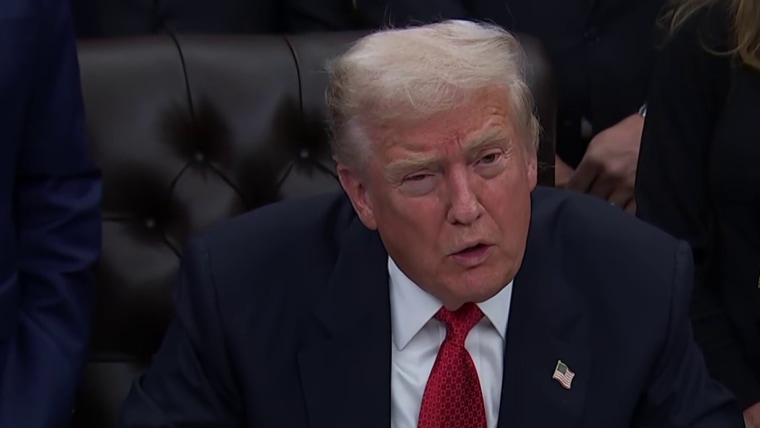WASHINGTON — House Speaker Mike Johnson says he still has “PTSD” from the GOP’s failed effort to repeal and replace the Affordable Care Act during President Donald Trump’s first term.
Now, the party is about to plunge back into the tricky policy debate that once cost them seats in the House.
This time around, though, Republicans are mostly stopping short of calling for a full-scale repeal of President Barack Obama’s signature health care law, even as they slam the policy as a failure. Instead, the mantra among Republicans is “fix Obamacare.”
But the clock is ticking. Open enrollment for health insurance has already begun and enhanced Obamacare subsidies are set to expire at the end of the year, more than doubling insurance premiums for millions of Americans in red and blue states alike, with some seeing increases of thousands of dollars per month.
Republicans, under pressure from Democrats after the government shutdown revived the health care clash, have not coalesced around legislation or even an abstract idea, and are only now starting serious discussions about putting proposals together.

As the party scrambles to craft an alternative, multiple Republicans are vying for Trump’s endorsement of ideas that could alleviate skyrocketing costs that are just around the corner. Two Republican senators have competing plans to create federally funded spending accounts that would help Obamacare enrollees directly, rather than subsidize insurers to keep costs down.
Johnson, R-La., said House Republicans have also been brainstorming proposals behind the scenes and will “be rolling out some of those ideas,” but he declined to put a timeline on it.
“I haven’t prejudged that or put any dates on it, but I mean, we worked on it today. We’ve been working on it every day. We got more members joining the discussion,” Johnson told NBC News on Wednesday evening. “This is how it works. It’s a deliberative process, where you build out the consensus, and we’ll be working on that in earnest in the days ahead.”
Johnson also said he recently traded texts with House Minority Leader Hakeem Jeffries, D-N.Y., about the possibility of working on a bipartisan solution. But Jeffries is pushing for a three-year extension of the expiring ACA tax credits, which Johnson has said is a nonstarter.
If Republicans aren’t able to agree on an alternative solution before the end of this year, they’ll have to decide whether to join with Democrats in extending the ACA tax credits, which risks drawing Trump’s ire, or letting them expire, which risks infuriating voters ahead of next year’s midterm elections.
Republican Rep. Jeff Van Drew of New Jersey, who said he talked to Trump at length last week about the importance of health care, warned, “not only is it morally bankrupt, it’s political suicide” for Republicans to let the subsidies expire without an alternative in place.
Sen. Rick Scott, R-Fla., told NBC News he pitched Trump on his plan, which would put federal money in health savings account-style accounts for individuals to “increase competition and drive down costs.”
Scott hopes to release the text of the bill as soon as possible, citing a mid-December deadline set by Senate Majority Leader John Thune, R-S.D., to give Democrats a vote on the expiring ACA subsidies.
Scott, who chairs the Senate Republicans’ policy committee, invited health care-focused guest speakers to weekly party lunches over the last six weeks to illustrate why members should oppose extending the ACA subsidies, as Democrats were demanding during the shutdown.
“Obamacare has failed us. Cost has skyrocketed,” Scott told reporters in the Capitol on Monday. “The way to fix it is, any Obamacare subsidies go to the individual through an HSA and then allow people to buy whatever plan that fits their family.”
It’s an idea that Trump — who stepped up his public attacks on Obamacare last week when Democrats were still digging in on their shutdown demands — seems open to.
“We’re gonna pay a lot of money to the people. They’re gonna go out and buy their own health care, and we’re gonna forget this Obamacare madness,” Trump said during a bill signing to end the shutdown Wednesday evening.
Earlier this week, Trump suggested naming the replacement plan “Trumpcare.”
Despite the president repeatedly railing against Obamacare, a White House official told NBC News that Trump had not ruled out extending the ACA subsidies.
“We need to do the right thing policy-wise but also the smart thing politically,” said the official, who spoke on the condition of anonymity to describe the president’s thinking.
Another emerging idea is from Sen. Bill Cassidy, R-La., chairman of the Senate’s health committee, who advocated for flexible spending accounts that, like Scott’s proposal, would help Obamacare enrollees directly.
Cassidy has pitched his idea to Republicans and the Trump administration, but also across the aisle as the only tangible solution to address rising health care costs with a chance of passing the House and being signed into law by Trump.
“I don’t know if we can get something bipartisan, but you never can unless you at least give it a shot,” Cassidy said. “We actually want to get something that lowers health care costs for the American citizens implemented as quickly as possible. There’s some things we’re going to disagree on that might be really good policy, but if we’re going to get it done quickly, it has to be things that we do agree on.”
The viability of those ideas remains to be seen.
“While Republicans have talked for years about replacing the ACA, none of these current ideas are fully fleshed out yet. A tweet is not a health care plan,” said Larry Levitt, executive vice president for health policy at KFF, a nonpartisan research group. “So, it’s hard to tell exactly how these concepts of replacing ACA premium assistance with cash or health accounts would really work in practice.”
“If people could use these Trump health care dollars to buy insurance not regulated by the ACA, it would likely cause the ACA to collapse and upend protections for pre-existing conditions,” Levitt continued.
There is a third option. Republicans could try to overhaul Obamacare with only GOP votes by using the “budget reconciliation” process for a second time during Trump’s second term. The procedural tool allows Republicans to pass legislation with a simple majority, and Trump ally Sen. Lindsey Graham, R-S.C., has advocated doing so, pitching it as an alternative to Trump’s calls to get rid of the filibuster.
Graham has even suggested crafting a Republican alternative to Obamacare and passing a package by Jan. 1 — no small feat — to avoid higher premiums from kicking in, according to two people familiar with his private comments. Graham’s suggestion is not being considered as a serious proposal because of the monumental lift required to put together such a plan, these people said. And, it’s an open question what would even be allowed under Senate rules, with multiple senators and aides telling NBC News they would need to run it by the Senate’s parliamentarian, who referees the reconciliation process, before hitting go.
Republicans tried multiple times during Trump’s first term to repeal or undo Obamacare.
“The definition of insanity is doing the same thing over and over again and expecting a different result, and that applies here,” Van Drew said. “I don’t want us to flounder around, say we’re working on something, go back and forth. And then Jan. 1 comes, and some people are not able to pay their bills because their health insurance costs so much, or other folks just give up their health insurance.”
Van Drew said if they can’t pass an alternative before the end of the year, then they need to extend the subsidies for another year in order to buy themselves more time.
And if Republicans don’t act, then Van Drew said he’d be open to signing a discharge petition to prevent ACA subsidies from lapsing — a tricky and rarely used procedural tool to go around leadership’s head that requires 218 signatures to succeed. Jeffries started a discharge petition Wednesday for a three-year extension of the ACA tax credits; if every Democrat signs on, they’ll need four Republicans to join them to force a House vote. That is unlikely to happen.
“If we don’t do anything, we just flounder around, it’s certainly something I would consider,” said Van Drew, who participated in a bipartisan and bicameral health care meeting last week.
Senate Minority Leader Chuck Schumer, D-N.Y., said Republicans now “own” the health care crisis, previewing the Democratic line of attack ahead of the midterms.
In exchange for opening the government, Democrats got a promise for a floor vote in mid-December on an ACA bill of their choosing. But there’s no guarantee about the outcome. Democrats are exploring ways to win over Republicans, such as changing the eligibility requirement or income caps. But another wrinkle has emerged: a battle over GOP demands for stricter abortion guardrails around the ACA money, which Democrats say is a nonstarter.
Meanwhile, Johnson has refused to commit to putting any Senate-passed ACA bill on the House floor. The speaker has insisted he needs to build consensus among his members first and has deputized House Majority Leader Steve Scalise, R-La., to work with the three chairmen of the committees with relevant jurisdiction over the issue, as well as the GOP doctors caucus, to put together some ideas. The working group will hold listening sessions with members next week.
Rep. Ralph Norman, R-S.C., told NBC News the ACA money should “absolutely” expire, despite the wishes of some in the GOP to renew it.
“There’s not gonna be any deal cut,” Norman said.
Rep. Kevin Hern, R-Okla., the chair of the House Republican Policy Committee, said the GOP solution should not require federal money.
“We should look at how we’re going to lower costs without having to inject more federal dollars into it,” he said. “The Democrat solution is to throw more federal dollars at it. We don’t have the access to that.”
Rep. Marjorie Taylor Greene, R-Ga., has questioned how serious her colleagues are about a health care plan. Greene, the MAGA firebrand, who said her family’s health care costs have risen threefold since the ACA took effect, warned that her party will suffer politically in 2026 if they fail to improve the system.
“Republicans must finally come up with a plan to address affordability,” she told NBC News. “Ignoring this crisis will not only leave the American people in a crisis but will likely lead to losses in the midterms. We have the majority; it’s time to solve this problem that the Democrats created.”



